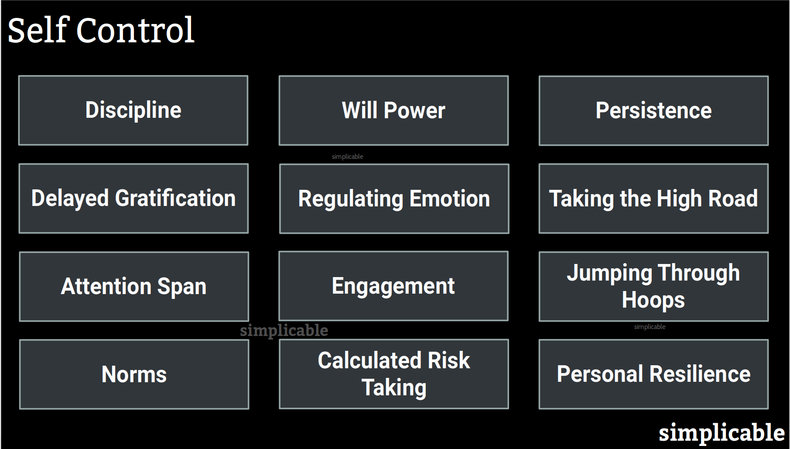

Discipline
Discipline is the ability to direct your energies in something even if you aren't feeling particularly motivated. This is very important because it is unlikely that you will happen to feel motivated to do everything that is worth doing in life. For example, a student who is able to study for hours at a time despite feeling bored and unmotivated.Will Power
The ability to plan to do something and then actually do it. For example, planning to be nicer to people all day and then actually achieving this behavior.Persistence
The ability to face failure after failure but continuing without loss of enthusiasm. For example, failing in a goal to be nicer to people, forgiving yourself and continuing to try.Delayed Gratification
The ability to accept pain now to have a benefit in the future. For example, not eating as you may desire in order to enjoy greater health in future.Regulating Emotion
The ability to act in an appropriate way despite surging emotions. For example, saying something reasonable in response to harsh criticism when your have a strong emotional urge to lash out.Taking the High Road
Remaining civil when someone is breaking the rules of civility. Without this form of self-control your personality will be dragged down to the level of whoever you are dealing with such that you may end up doing or saying things that aren't socially acceptable. For example, the ability to sideline an insult and continue with your day when a confrontation isn't going to be productive.Attention Span
The ability to concentrate for extended periods of time. For example, listening to someone without allowing your mind to wonder off into the realm of memory or imagination.Engagement
Engaging with others to participate in groups even if you don't find things particularly captivating. For example, concentrating in a meeting that is intellectually unstimulating.Jumping Through Hoops
The ability to complete tasks that are dreadfully uninteresting that nonetheless are required to do what you want to do. For example, spending an hour to renew a driver's license in a government office.Norms
The ability to conform to the norms of a society or culture where it makes sense to do so. For example, sitting through a presentation without playing with your phone.Calculated Risk Taking
Self-control should not be confused with risk avoidance. Calculated risk takers often demonstrate extremely high levels of self-control. For example, a boxer who endures an incredibly demanding and difficult training regime in preparation for a match. Likewise, risk avoidance such as hiding under your bed isn't necessarily self-control. Individuals with low self-control may take uncalculated and unmanaged risks that are essentially irrational.Personal Resilience
The ability to withstand stress without losing it. For example, a hotel manager who can listen to customer rants and complaints without losing their professional and friendly demeanor.Notes
Self-control can be cultivated with practice and isn't necessarily an inherent character trait.| Overview: Self-Control | ||
Type | ||
Definition | The ability to act in a directed manner despite motivation to do otherwise. | |
Related Concepts | ||
































